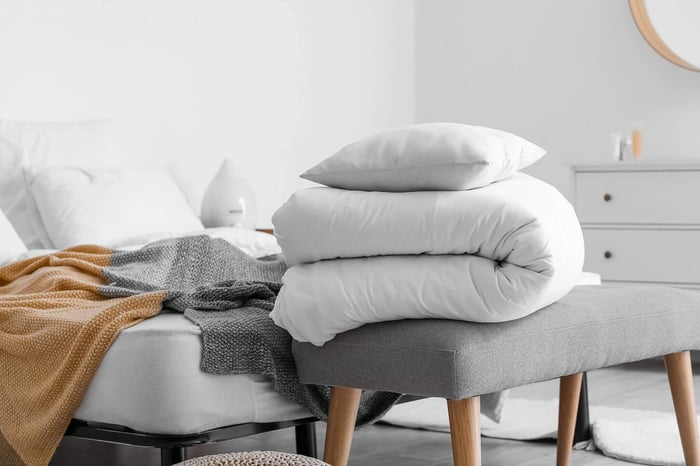Table of Contents
There’s something unmistakably different about sliding into a bed that feels fresh — cool, clean, and quietly grounding. That’s the promise of organic bedding. Beyond the softness you can touch lies a story of fields free from pesticides, farmers working with nature, and fibers that breathe with your body. It’s sleep that restores more than just your energy — it restores the planet too.
In a world where synthetic fabrics dominate, organic bedding stands apart for what it doesn’t contain: no chemicals, no toxins, no false comfort. Just the pure, natural feel of regenerative organic cotton and New Zealand wool, working together to help you sleep deeper and wake brighter. Because true rest doesn’t come from thread counts — it comes from knowing your comfort begins with care.
So when it comes to achieving high-quality sleep, the bedding you choose plays a crucial role. Organic bedding has gained popularity for its numerous benefits, contributing to better sleep and overall health.
In this post, we'll explore the advantages of organic bedding, focusing on terms like sleep quality, organic, natural, sustainable, high quality, and regenerative. We'll also touch on specific materials such as regenerative organic cotton, sustainable cotton, high-quality cotton, and wool, highlighting regions like New Zealand and India known for producing these exceptional materials.
What is Organic Bedding?
It is bedding made from natural fibers grown without synthetic pesticides or fertilizers. Materials like regenerative organic cotton and regenerative wool, known for their environmental and health benefits, are included in this category.
Organic Wool Comforter | Made in New Zealand, Breathable All-Season Comfort

$342.00
$380.00
Sleep naturally better with our organic wool comforter, made in New Zealand from ZQ-Certified regenerative wool. It’s soft, breathable, and hypoallergenic — gentle on sensitive skin while keeping your temperature perfectly balanced all year round. Unlike down or synthetic comforters… read more
Who Benefits from Organic Bedding?
It can benefit anyone looking to improve their sleep quality and overall health. It's particularly beneficial for individuals with allergies, sensitive skin, or those seeking a more sustainable lifestyle.
Where Can You Find Organic Bedding?
It can be found at various retailers, both online and in physical stores. Countries like New Zealand and India are renowned for producing high-quality organic cotton and wool, making them excellent sources for premium bedding products.
When Should You Consider Switching to Organic Bedding?
If you're experiencing poor sleep quality, overheating at night, or health issues related to conventional bedding, consider switching to organic bedding. Investing in quality materials can lead to restorative sleep and better overall well-being.
How Does It Improve Sleep Quality?
Bedding materials, such as regenerative wool and organic cotton, are breathable, moisture-wicking, and temperature-regulating. These properties help maintain a cool temperature, reduce sweat, and promote deeper REM sleep. High-quality cotton sateen sheets offer a soft and luxurious feel, enhancing comfort throughout the night.
The Benefits of Organic
Improved Sleep Quality
Organic materials like wool and cotton help regulate body temperature, preventing overheating and excessive sweating. This promotes uninterrupted, quality sleep. Unlike conventional microfiber bedding made from plastic, which can overheat you, organic materials ensure you wake up refreshed. We prioritize sleep quality, not just quantity.
Health Benefits
Bedding that is free from harmful chemicals and synthetic materials reduces the risk of skin irritations and allergies. It supports good health by providing a cleaner sleeping environment. You will notice a drier bed in the morning, thanks to the wool's natural moisture-wicking properties. This means no nasty germs or bacteria will grow, giving you a cleaner, healthier bed.
Sustainable and Environmentally Friendly
Bedding that is produced using sustainable farming practices. Regenerative organic cotton and wool farming methods improve soil health, enhance biodiversity, and reduce carbon footprint. Our farms, spanning 3.7 million acres, work to restore the planet by removing excess carbon from the atmosphere.
High-Quality Materials
Regenerative wool and high-quality cotton from New Zealand and India are known for their durability and comfort. These materials create a luxurious sleeping experience that lasts. Our farmers use low-impact methods—no harsh chemicals, no synthetics—just pure, natural materials that are healthier for you and the planet.
Versatile Sizes and Options
Our bedding comes in various sizes, including queen, king, California king, and XL king, ensuring a perfect fit for any bed. Whether you're looking for duvets, duvet comforters, comforter sheets, or sateen sheets, there's an organic option for you.
Protecting Your Investment: Care and Durability
While the upfront cost of high-quality organic bedding is an investment, the superior durability of materials like regenerative organic cotton and New Zealand wool ensures it is a long-lasting bedding choice. Proper care is key to longevity. Generally, caring for organic cotton involves gentle washing with natural detergents, while learning how to clean wool items often means spot-cleaning or using a specific, wool-safe cycle. By following these simple steps, you maintain the fabric's integrity and enjoy a superior, safe and healthy sleep environment for years to come.
Organic Cotton Sheets – Soft, Breathable & Sustainable

$189.00
Softer Sheets. Cleaner Sleep. Our organic cotton sheets are naturally breathable and silky-smooth—crafted from cotton grown without harmful chemicals on regenerative farms that care for the soil as much as your sleep. Thanks to its natural purity and moisture-wicking power,… read more
How to Choose the Best Organic Option
For total peace of mind, always look for reputable certifications on your nontoxic bedding. The GOTS certified (Global Organic Textile Standard) label is the gold standard, guaranteeing that the fibers are organically grown and that the entire manufacturing process meets strict ecological and social criteria. Additionally, the OEKO-TEX Standard 100 certification assures you that the final product, including all threads and dyes, is free from harmful levels of over 100 substances. These labels are your assurance that you are truly investing in a safe and healthy sleep environment.
Understanding Organic Bedding Weaves
Beyond the fiber itself, the fabric's weave plays a huge role in your comfort. Organic percale sheets are known for their crisp, matte finish and are favorites for hot sleepers as they feel cool and light—the perfect choice for cooling sheets. In contrast, organic sateen sheets are woven for a smooth, luxurious, almost silky drape that offers exceptional softness. Both are highly breathable sheets, but knowing the difference will ensure you select the best organic cotton texture for your personal preference and climate.
Checklist for Buying Organic
Identify Your Needs: Determine what you need most from your bedding, such as cooling properties, hypoallergenic materials, or moisture-wicking capabilities.
Research Materials: Look for bedding made from regenerative organic cotton, sustainable cotton, high-quality cotton, or regenerative wool.
Check Certifications: Ensure the bedding is certified organic and produced using sustainable practices.
Consider Sourcing: Choose products sourced from reputable regions like New Zealand and India, known for their high-quality materials.
Read Reviews: Look for customer feedback to gauge the quality and comfort of the bedding.
Compare Costs: Organic may be more expensive but consider it an investment in your health and sleep quality.
Where to Buy Organic Cotton and Wool
Organic cotton is available at specialized retailers, eco-friendly stores, and online marketplaces. Look for brands committed to sustainability and quality, such as those offering regenerative organic cotton and wool products.
Ideas for Incorporating Organic in Your Home
Start with Sheets: Replace your conventional sheets with organic cotton sateen sheets for immediate comfort.
Upgrade Your Duvet: Choose a regenerative wool duvet to experience its natural temperature-regulating properties.
Layer with Comforter Sheets: Add high-quality cotton comforter sheets for an extra layer of warmth and softness.
Invest in Full Sets: For the ultimate organic sleep experience, consider purchasing full bedding sets that include sheets, duvets, and pillowcases.
FAQs About Organic
What is Regenerative Organic Cotton?
Regenerative organic cotton is grown using farming practices that restore soil health and promote biodiversity. It is free from synthetic pesticides and fertilizers, making it a healthier and more sustainable option.
How Does Wool Bedding Improve Sleep?
Wool bedding regulates temperature, wicks away moisture, and provides a hypoallergenic sleeping environment. These properties help prevent overheating and promote deeper, restorative sleep.
Is It Worth the Cost?
Yes, organic bedding is worth the investment. It offers numerous health benefits, supports sustainable farming practices, and provides superior comfort and durability compared to conventional bedding.
Can Organic Bedding Help with Allergies?
Yes, organic bedding is ideal for individuals with allergies or sensitive skin. It is free from harmful chemicals and synthetic materials that can trigger allergic reactions.
How Do I Care for Organic Bedding?
Organic bedding should be cared for according to the manufacturer's instructions. Generally, it can be machine-washed on a gentle cycle with mild detergent. Avoid using bleach or fabric softeners and tumble dry on low heat.
The Organic Bedding Difference
Here is a quick summary of the transformative benefits you gain by switching to high-quality organic bedding:
Superior Sleep Quality: Materials like regenerative wool and organic cotton are naturally breathable and temperature-regulating, helping hot sleepers maintain a cool temperature for uninterrupted, restorative sleep.
Cleaner, Healthier Environment: Certified nontoxic bedding is free from harmful chemicals, flame retardants, and synthetic materials, making it ideal for allergies and sensitive skin.
Environmental Responsibility: Choosing GOTS-certified or regenerative organic cotton and wool supports sustainable farming practices that actively restore soil health and reduce the carbon footprint.
Built to Last: High-quality fibers from regions like New Zealand and India ensure superior durability, making organic bedding a long-lasting bedding investment that stands up to time and gentle care.
Informed Choice: Look for key certifications like GOTS certified and OEKO-TEX Standard 100 to ensure you are selecting a product that meets the highest standards for both health and sustainability.
Conclusion
Investing in organic bedding is a smart choice for those seeking better sleep quality and a healthier lifestyle. With its natural, sustainable, and high-quality materials, organic bedding provides numerous benefits that enhance your sleep experience. Whether you choose wool from New Zealand or cotton from India, you will surely enjoy the transformative power of restorative sleep.
Switch to organic bedding today and discover the difference it can make in your sleep and overall well-being. By choosing organic, you're not only improving your health but also supporting sustainable farming practices that benefit the planet.
FAQs on Wool Duvet Inserts, Comforters & Sustainable Bedding
What makes organic bedding different from regular bedding?
Organic bedding is made from natural fibers like organic cotton or regenerative wool grown without synthetic pesticides, dyes, or fertilizers. It’s free from harmful chemicals, allowing for a healthier and more breathable sleep environment.
Is organic bedding better for sensitive skin or allergies?
Yes. Organic materials are naturally hypoallergenic and gentle on skin, reducing irritation and allergic reactions often triggered by synthetic fabrics or chemical finishes.
How does organic bedding improve sleep quality?
Natural fibers help regulate temperature and moisture, keeping you cool in summer and warm in winter. Without chemical residues, your body can relax into deeper, uninterrupted rest.
Is organic bedding environmentally friendly?
Absolutely. Organic and regenerative farming practices restore soil health, conserve water, and protect biodiversity. Choosing organic bedding helps reduce your carbon footprint and supports sustainable agriculture.
How long does organic bedding last compared to synthetic bedding?
High-quality organic bedding is more durable because the fibers aren’t weakened by chemical processing. With proper care, it can last for many years — often outlasting synthetic alternatives that break down faster.




